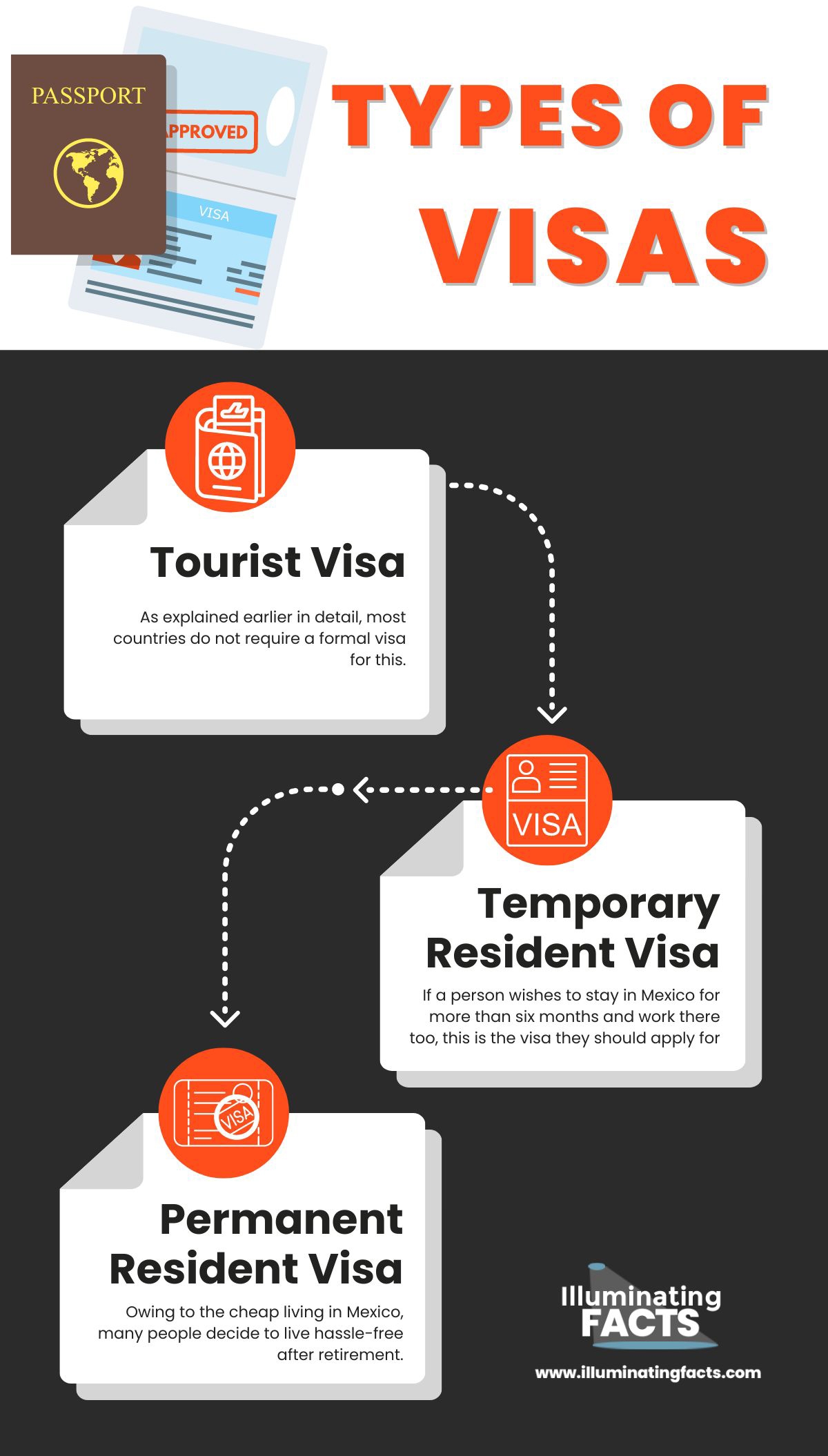Table of Contents
An important and challenging part of traveling abroad is gathering information about that country’s immigration policies. These immigration laws and visa policies help you understand your position better. Just because you have made up your mind and have money at hand does not mean you can go anywhere.
Fortunately, Mexico is a laid-back country. Its policies are not that strict, and many countries don’t even require a visa to visit. We will get to that in detail later. First, you will need to know the basics of flying to Mexico and all its related requirements.
Immigration Policies
History tells us that the land of Mexico has seen its fair share of colonies and expansions. There was a time when people from abroad filled unpopulated areas due to cheap rates. Most of them were from America or Europe. According to 2020 stats, more than 73% of the total immigrants in Mexico are from the US[i].
Surprisingly, Mexico’s overall immigration policies are not strict at all. Getting a legal entry in Mexico depends on the following three factors:
- Country of birth
- Reason for staying
- Length of stay
While most countries require a visa to travel to Mexico, 69 countries are exempt from this formality. These countries include the United States, the EU countries, Schengen countries, and United Arab Emirates. People from these countries only have to travel to Mexico, and then they can stay up to 180 days without a visa.
If you aren’t a citizen of the mentioned countries, you can still be exempted from the visa if[ii]:
1. You already have a valid visa for:
- Canada
- Japan
- The United States
- The Schengen area
- The United Kingdom
2. You have a residence permit for:
- Canada
- The United States
- Chile
- Japan
- Colombia
- The Schengen area
- Peru
- The United Kingdom
3. You have a service category or diplomatic passport issued by your country.
4. You have an APTEC Business Travel Card with the “MEX” code at the back by any of the following countries:
- Australia
- Brunei
- Chile
- China
- Hong Kong
- Indonesia
- Japan
- South Korea
- Malaysia
- New Zealand
- Papua New Guinea
- Peru
- Philippines
- Russia
- Singapore
- Taiwan
- Thailand
- Vietnam
Even with the exemption of visas for up to 180 days, Mexico allows visitors from a handful of countries to apply online. The process is known as Electronic Travel Authorization and is eligible for Turkey, Russia, and Ukraine. This authorization is valid for air travel only.
Visa Requirements
Even when you don’t need to have a six-month visa, you will still have to provide other basic documents to check. It would be best if you have each of the following available:
- A valid passport that will remain valid for at least 180 days.
- A neatly completed Multiple Immigration Form (FMM). You can also get this form from the airport, but the best option is to get it printed and filled beforehand to be on the safe side.
- Depending on the purpose of your visit, the authorities may ask you for specific documents, such as hotel reservations for tourists or business letters in Spanish, as proof of your visit.
Types of Visas
After discussing the countries welcomed in Mexico without a visa, it is time to talk about the rest of the world. Mexico, being a tourist destination, attracts a lot of people every year. But then again, stats show that people choose Mexico as a part of their retirement plan and permanent residency.
Mexico’s visa policies are more straightforward than most countries of the world. Mexico has three main types of visas for entry into the country:
1. Tourist Visa
As explained earlier in detail, most countries do not require a formal visa for this. A tourist visit can be of 180 days but not past 180 days. This type does not allow any activity in Mexico for which the visitor gets paid.
2. Temporary Resident Visa
If a person wishes to stay in Mexico for more than six months and work there too, this is the visa they should apply for[iii]. It requires a longer visa process that leads to a work permit and works visa.
3. Permanent Resident Visa
Owing to the cheap living in Mexico, many people decide to live hassle-free after retirement. People who want to start over at some point in their lives are also welcomed to apply for permanent residency. Foreigners who have close relatives already living in Mexico are eligible for permanent residence.
Types of Temporary Visa
There are three types of temporary visas for Mexico:
1. Mexico Work Visa
This type of visa is strictly for those who wish to stay in Mexico while earning money while on Mexican land. The stay is supposed to be longer than six months, and a person with a valid Work Visa can remain for up to 4 years in Mexico.
To apply for a Work Visa, you should have a work permit issued by your employer in Mexico. In other words, you should have proof of employment. Your employer will be the one who will apply for your work permit. For that, you will have to submit a work permit request form, job offer/contract, company’s information, your original academic certificates, and the CV using which you applied. If anything, else is needed, your employer will inform you.
Once you have gotten your hands on a work permit, you must apply for Work Visa within 15 to 30 days. On arrival in Mexico, you will get your Temporary Residency Card from the National Immigration Institute.
2. Mexico Student Visa
Foreigners who wish to take part in a course in Mexico will receive a Student Visa. This visa may include tourists who stay for six months, but the academic course span fits in those months.
Apart from the legal formalities like a valid passport and proof of steady income, a person must also show their letter of acceptance from the Mexican Institute. It is crucial to authenticate your claims as a student and get the visa process started. It is important to note, a student is not allowed to work in Mexico with just a Student Visa. If they have a job offer, they must follow the procedure for getting a work permit via their employers[iv].
3. Mexico Family Visa
A family visa is for people whose close relatives are already a citizen of Mexico and want to join them from a foreign country. The procedure is the same as other types of visas. The only difference is the requirement of having to prove your relationship with the relative living in Mexico[v]:
- Proof of common-law union or marriage certificate for spouse/partners.
- If the relative is a resident cardholder, the original and copy of their Resident Card.
- Birth certificates for parents, children, or siblings, proving the family ties.
- If your relative is a student, proof of enrollment from the institute is required.
The process is not complete unless you get a Resident Card for yourself, too. To do that, you must apply for a Resident Card within a month of your arrival in Mexico. Without the card, your stay may be compromised.
Permanent Resident Visa
Visitors can get this type of visa if they want to stay and work in Mexico indefinitely. Mexico is a favorite country for retired people, but it can also be generous for young people. The advantages of applying for a Permanent Resident Visa are:
- You can work without getting a work permit.
- You can apply for a healthcare program and health insurance for expatriates.
- You will have to apply only once without the need of getting it renewed repeatedly.
- You can leave and enter Mexico without any restrictions.
Getting a permanent residency in Mexico is easy. Often, temporary visas can lead to permanent residence if the person wishes and if they have been a good citizen during their temporary stay. Applying for a permanent residence is easy if[vi]:
- You have found a long-term job in Mexico.
- You have close relatives who can vouch for your stay.
- You are studying in a Mexican institute and plan to work there too.
- You want to retire in Mexico.
- You have stayed in Mexico for at least four years on a Temporary Residence Visa.
A person will also be eligible for permanent residency if they seek political asylum for valid reasons. However, they will have to prove their reason for escaping their country and ensure good conduct on the land of Mexico. Moreover, a child born to a temporary resident in Mexico is a permanent resident by default, and the baby’s parents can also apply for permanent residency under such circumstances.
Additionally, a foreigner is expected to keep the authorities informed of their immigration status, such as marital status, employment, and academics. They are also required to register with the National Register of Foreigners and notify the National Migration Institute if any status changes[vii].
[i] “Immigration to Mexico.” Retrieved from https://en.wikipedia.org/wiki/Immigration_to_Mexico
[ii] “Do You Need a Visa to Go to Mexico?” Retrieved from https://visaguide.world/north-america-caribbean/mexico-visa/who-needs-visa/
[iii] “Mexico Temporary Resident Visa.” Retrieved from https://visaguide.world/north-america-caribbean/mexico-visa/temporary-resident/
[iv] “Mexico Student Visa.” Retrieved from https://visaguide.world/north-america-caribbean/mexico-visa/temporary-resident/student/
[v] Mexico Visa for Family Reunion.” Retrieved from https://visaguide.world/north-america-caribbean/mexico-visa/temporary-resident/family/
[vi] “Mexico Permanent Residence Permit.” Retrieved from https://visaguide.world/north-america-caribbean/mexico-visa/permanent-residence/
[vii] “Immigration Law in Mexico.” Retrieved from https://mexlaw.com/immigration-law-in-mexico-2/




